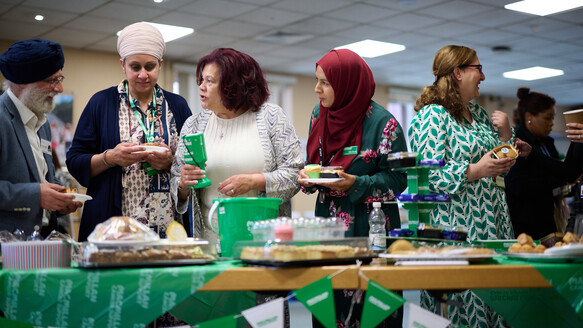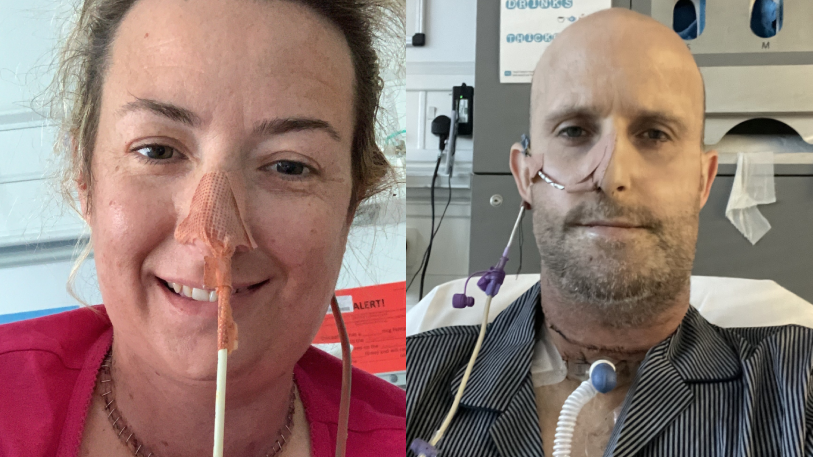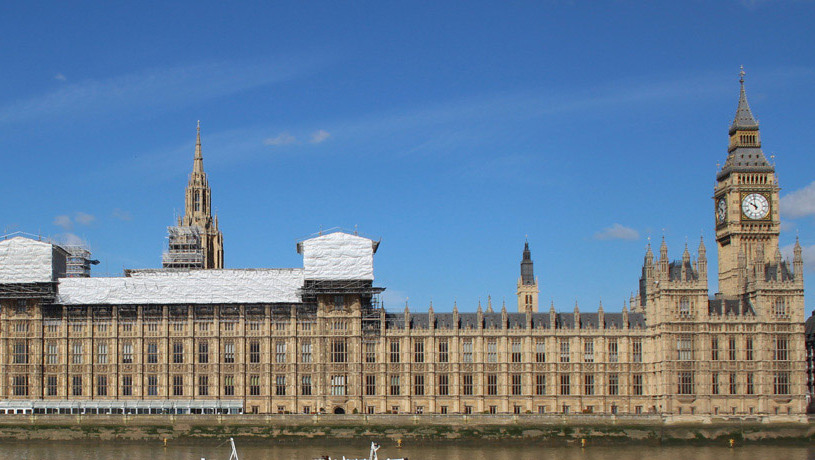Tens of millions of lives have been touched by cancer across the UK — so why do we still find it so hard to talk about?
- New figures from Macmillan Cancer Support reveal how common cancer is amongst us
- Two in three of us (64%) either have close family or close friends living with cancer or have been diagnosed with cancer ourselves
- However, previous research shows one in seven of the UK public say being diagnosed with a serious illness such as cancer would be a ‘taboo’ subject
- Coming to terms with their diagnosis first and not wanting to burden friends are among the most common reasons why people with cancer delay telling their close friends
- Macmillan is urging people to host their own Coffee Morning this month, to help open up the conversation and break down barriers
Talking about cancer is still a challenge across the nation, despite the latest insights from Macmillan Cancer Support revealing that almost all of us have a connection to someone with cancer.
Across every nation and region of the UK, every generation from the youngest to the oldest, and every socioeconomic and income group, cancer has touched the majority of people’s lives in some way[1]. And for tens of millions of people across the UK, cancer is near to home — almost two in three of us (64%) either have close family or close friends living with cancer or have been diagnosed with cancer ourselves[2].
Yet despite so many of us having a direct link to cancer, the charity’s research also shows how difficult it can be to open up and discuss our thoughts and concerns. Discussing serious illnesses such as cancer can even be considered to be an off-limits topic, with previous data from Macmillan showing one in seven (15%) of the UK public say being diagnosed with a serious illness such as cancer would be a ‘taboo’ subject with either their close family or friends[3].
The figures come out ahead of Macmillan’s annual Coffee Morning (on Friday 29th September). Other data from the charity shows one in five people with cancer (19%) have been reluctant to talk about emotional issues related to their cancer, such as feelings of sadness, worry, anger or guilt, because of how other people might react[4]. Furthermore, almost half (45%) of people with cancer in the UK with close friends delay telling them about their diagnosis or keep it a complete secret from them[5].
While the most common reason people wait to tell close friends is so they can come to terms with their diagnosis first, another major factor is people not wanting to burden their loved ones with the news[6].
Macmillan recognises that it can sometimes be tricky to open up. This is why the charity is calling upon the nation to put the kettle and host their own coffee morning, big or small, to encourage the conversation and give people a safe space to share what’s on their mind.
Rian Harvey, 23 from Dorset was diagnosed with leukaemia aged 14. His cancer also returned in his later teenage years. Rian has gone from pretending it never happened to realising the importance of opening up and is now leading the way in encouraging people, especially men, to talk about cancer.
“I was 14 when I was first diagnosed with leukaemia and at that point, I just didn’t want to talk about it because it would reaffirm the news that I had cancer and that’s something I was trying to escape. I didn’t realise that I needed support until after I had finished cancer treatment.
“When you have cancer, you live life at a million miles an hour. You say yes to everything, rightly or wrongly, living life at such a fast pace. Because of that, I wasn’t dealing with the issues I had.
“I was getting unfit and unhealthy, falling out of love with things I used to really enjoy. I needed to talk about cancer. Once I did, things started to feel so much better. I talk a lot about my experience by connecting with others on social media. It’s nice seeing more guys talking — this is just the start and hopefully we can build on this — and we all need to know that it’s ok to talk and it’s important to do so.”
Claire Rowney, Executive Director of Fundraising, Marketing and Innovation at Macmillan Cancer Support.
“We understand how difficult it can be to open and discuss something like cancer, and not wanting to feel like a burden. But we also understand the benefits of talking and sharing with your loved ones, and the value of talking overall.
At Macmillan, we’re here to do whatever it takes to support people living with cancer and by hosting a Coffee Morning, you can help us do that. That’s why we’re encouraging people to host their own Coffee Morning — whether big or small — to help provide a space for people to open and have a natter over a cuppa and maybe a slice of cake.
So, sign up to host a Coffee Morning today — it may end up being the most important coffee morning you ever have.”
Macmillan Cancer Support’s annual Coffee Morning fundraiser returns again this year, officially taking place on Friday 29th September, with local events occurring up and down the UK to help raise vital funds for people living with cancer.
Sign up at https://coffee.macmillan.org.uk/ to play your part. Whatever your coffee morning looks like, it’s always a great idea to have one. If you need support from Macmillan, contact the Support Line on 0808 808 0000 or visit www.macmillan.org.uk
About Macmillan Cancer Support
References
Respondent group
% who know someone diagnosed with cancer
England
82%
Scotland
84%
Wales
81%
Northern Ireland
85%
North East
91%
North West
77%
East Midlands
88%
West Midlands
78%
East of England
81%
South East
84%
South West
83%
London
81%
[2] As per ref 1. ’Tens of millions’ statements taken by applying the relevant % to the current UK population of 67 million people. Source: Office for National Statistics. United Kingdom population mid-year estimate. Accessed September 2023.
[3] Macmillan Cancer Support/YouGov survey of 2,120 UK adults aged 18+, including 136 who have had a cancer diagnosis. Fieldwork was undertaken between 8th — 9th April 2019. The survey was carried out online. The figures have been weighted and are representative of all UK adults (aged 18+). Question wording was as follows: Which, if any, of the following would be a taboo subject between you and [close family member/close friend] (i.e. you would find it difficult to talk to them about it)?
[4] As per ref 4. Question wording was as follows: Which, if any, of the following issues related to your cancer have you ever been reluctant to talk about because of how other people might react?
[5] Macmillan Cancer Support/YouGov survey of 2,033 UK adults aged 18+ who have had a cancer diagnosis. Fieldwork was undertaken between 3rd and 8th October 2014. The survey was carried out online. The figures have been weighted and are representative of people living with cancer in the UK. Respondents were asked how long after their diagnosis they told different people in their lives about their diagnosis. With regards to close friends, 42% said they waited a while before telling them, and 3% still hadn’t told them
[6] As per ref 6. Among those who waited to tell close friends, 22% said it was because they didn’t want to burden them
Read more
-
News and stories 10 Sep 2025In this blog, Gemma reflects on the impact Macmillan made last year ahead of the launch of Macmillan Cancer Support's Annual Report for 2024.
-
News and stories 03 Sep 2025Anthony Cunliffe, National Lead Medical Adviser at Macmillan, explains why more needs to be done to make cancer care fair.
-
News and stories 10 Jul 2025The Prime Minister launched the government’s long-awaited 10 Year Health Plan, outlining a vision to “bring the NHS closer to home.”





